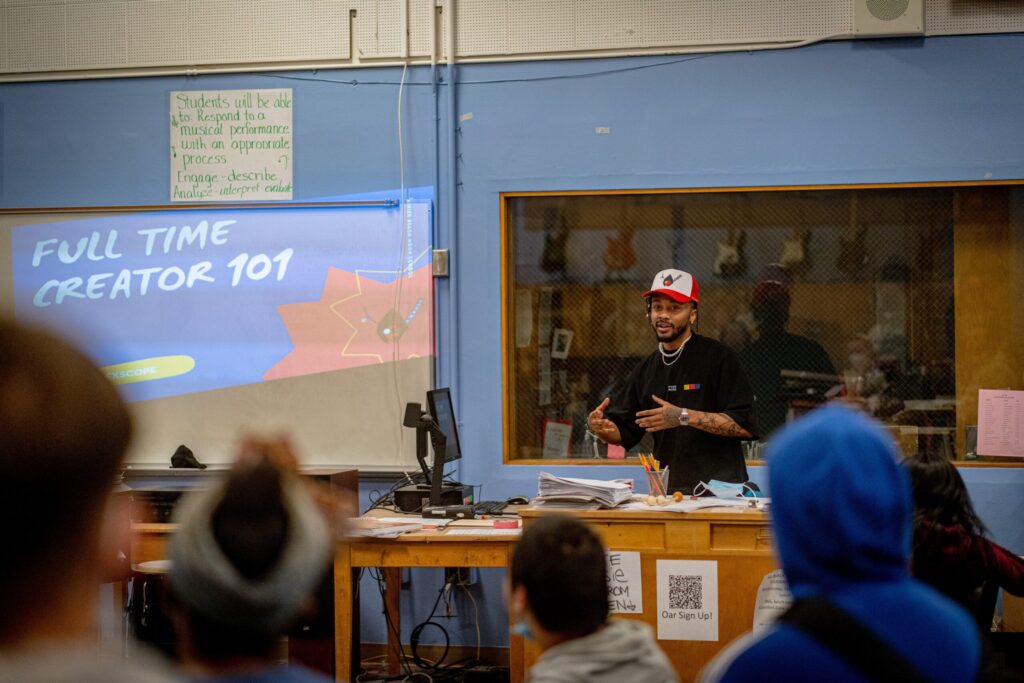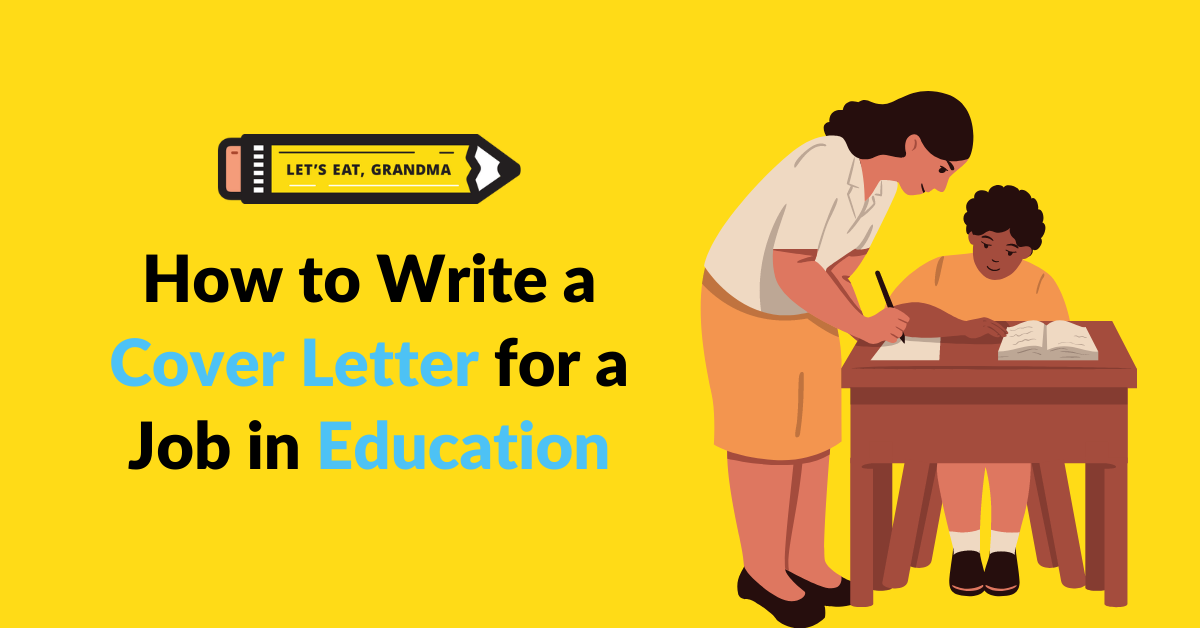How important is a cover letter when it comes to landing a job in education? Well, it can show your personality, explain a career change, or diffuse any potential red flags. It can also demonstrate your commitment to your students – which is what it’s all about!
When I started my journey into the field of education, my college professor asked a very important question to the group. Do you want to be liked or do you want to be respected?
We all said we wanted to be respected, of course. Like Mr. Feeny of TV sitcom fame or the Hilary Swank character from the box office hit Freedom Writers. But, it turns out that we had it all wrong.
The teaching profession is mostly based on capability, flexibility, and–you guessed it–likability. Eventually, all of those qualities together will earn the respect of even your toughest students. And, those are exactly the qualities that a hiring manager or principal looks for during the application process.
Yes, your resume communicates your credentials and experience, but your cover letter explains your classroom management style and the tone you’ll set for your students. It’s the cover letter that has the power to show that you care more about building relationships than building your ego.
In other words, a resume and cover letter are a package deal.

Photo by LexScope on Unsplash
What’s a cover letter?
Let’s start with the basics.
A cover letter is a crucial component of any job application. It is an opportunity to introduce yourself to a potential employer, showcase your qualifications and highlight the skills and experiences that make you the best candidate for the job.
A cover letter is especially important for a teaching position because it gives you the chance to breathe life into your application.
You are more than a long list of bullet points on a resume, and a cover letter gives you the chance to add a human element to your application.
Remember, a cover letter for a teaching position is meant to demonstrate your qualifications, but it is also a great way to highlight your ability to connect with students and colleagues.
Do I really need a cover letter for a job in education?

Photo by Adam Winger on Unsplash
Yes, you really do. Many school districts require a cover letter during the application process. Other schools take an informal approach and ask applicants to contact the principal of the building directly. In this case, you can attach the file to an introductory email or simply use the cover letter as the body of your introductory email.
Either way, it’s an important tool that can help you get an interview.
With that in mind, here are the top benefits of including a cover letter for a job in education:
You can show your personality
Resumes follow a strict formula, so it’s difficult to squeeze any personality into your bullet points.
However, a cover letter is more flexible with word choice, sentence structure, and overall format.
You can show that you are a dynamic, effective communicator who is ready to take on any challenge. You can give examples of building trust with your students to help them understand the curriculum.
A cover letter is truly your time to shine.
You can explain a career change
If you are on the cusp of a professional pivot, you are not alone. Half of Americans who quit their jobs in 2021 made a career change. Your education cover letter is prime real estate that can be used to highlight transferable skills along with your teaching certification.
Be sure to make clear connections from your past experiences to your new field – like showing how your prior position required a lot of problem-solving and communicating with diverse audiences.
This is also a great reason to discuss any relevant volunteer work in your cover letter. Not only does it give a school district a look at your interests, it also shows that you are involved in the community, which is a big plus for educators.
You can address any potential red flags
There are many reasons to look for a job in education. Maybe you are a new teacher, or maybe you are a teacher who is relocating, changing schools, or looking to get back into the classroom after a career break.
It can be scary to explain these types of situations to a potential employer. That feeling is completely normal, and it’s important to take a proactive approach. A cover letter is the perfect place to set the record straight with a brief explanation.
How to write a cover letter for a teaching position

Photo by National Cancer Institute on Unsplash
Now that you know a cover letter is a vital component of your job application, let’s dive into some of the top tips for writing a winning cover letter for a teaching position:
- Tailor your cover letter to the specific position and school district. Before you start writing, take some time to research the school and specific position. Find out the school’s mission and values and the
requirements and qualifications for the job. Use this information to tailor your cover letter and show the hiring manager and principal that you are a great fit for the school culture. - Address the hiring manager by name. If possible, find out the name of the person who will be reading your cover letter and address them by name. This shows that you have done your research and are genuinely interested in the job. If you happen to know the principal of the building will be making the hiring decisions, you can address your cover letter directly to them.
- Use a strong opening sentence. Your opening sentence should grab the reader’s attention and make them want to read more. This is like the hook of your lesson plan. Begin with a professional greeting and introduce your top qualifications. This can include your level of experience, education, or passion for teaching.
- Keep it concise and to the point. Avoid repeating the exact information from your resume, and focus on the most important points. Limit your cover letter to one page, and use clear and simple language. (Check out
this blog post about how to use bullets in your cover letter for a great way to structure your teaching cover letter!) - Highlight your qualifications and skills. Briefly summarize your teaching experience, highlighting your most relevant qualifications, such as experience with certain age groups, subjects, or teaching methods. It’s best to use concrete examples to demonstrate your experience and achievements.
- Demonstrate your passion for teaching. This one is crucial for anyone looking for a teaching job. You should focus on your passion for teaching and your dedication to helping students succeed. Use specific examples
to demonstrate how you have helped students in the past and how you plan to help students in the future. - Show your enthusiasm for the school and the community. How do you plan to make a positive impact on the school? Take this chance to explain how your teaching philosophy aligns with the school’s mission and values.
Try to give an example or two of how you have made a difference in your previous teaching experiences; it can be an example from your classroom or from your time as a coach or club sponsor, too. - Close with a call to action. Your cover letter should end with a call to action that encourages the hiring manager to contact you for an interview. Be sure to include your phone number and email address, and express your enthusiasm for the opportunity to interview for the position. Also, be sure that your email address is professional and modern. You don’t want the school district to think that you aren’t up-to-date with current technology.
- Proofread, proofread, proofread! Before you submit your cover letter, make sure to proofread it for spelling and grammar errors. A cover letter with even one error can hurt your chances of getting an interview.
In addition, it’s a good idea to make a reference to the school or district’s current initiatives or programs, it shows that you’ve done your research and have a genuine interest in the school or district. You can usually find this information on the district’s website or social media profiles.
Next Steps
A cover letter is especially important for teachers because it highlights your teaching skills, and gives you a chance to emphasize your qualifications and enthusiasm for the job. And, if it’s a well-written cover letter, it can help you stand out from other candidates and increase your chances of getting an interview.
Ready to get started? Check out this tried-and-true cover letter outline.
Ready for more job search help?
Sign up for a free Senior Writer Resume Critique to see what’s holding you back from landing interviews. One of our top professional resume writers will give you personalized feedback on the top 3 items you can improve based on our expert practices!




